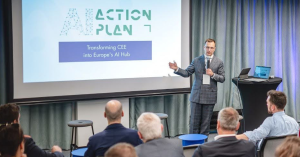Bulgaria’s GATE Institute, as a part of NATO’s Defense Innovation Accelerator for the North Atlantic (DIANA), is now officially a test center for the Alliance in the field of Big Data and Artificial Intelligence.
Established in 2019 as a structure of Sofia University “St. Kliment Ohridski”, the Big Data for Smart Society Institute (GATE) will now host innovators from across NATO Allies, who can bring their concepts for evaluation, verification and validation within this program.
One of DIANA’s key components is a network of test centers to support the development of new technologies, which have both military and civilian applications.
According to GATE’s director Sylvia Ilieva, the Institute’s mission is to serve as a bridge between the scientific community, the industry and the society, which also fits perfectly into DIANA’s concept.
“The outcome of the bid is a success not just for GATE, but also supports Bulgaria’s national priorities such as overcoming any gap in the technological development among the different Allies at NATO,” Ilieva said in a press release.
While it also enhances Bulgaria’s image as a reliable ally, having a NATO test center in the field of Big Data and Artificial Intelligence in the country also has the potential to attract new investors and provide Bulgaria access to the Alliance’s latest technologies, GATE said in a press release.
Accelerating the development of various solutions for technological challenges
NATO launched DIANA in 2021, with the mission to accelerate the development of solutions to technological challenges, critical for transatlantic security. The idea is to link existing innovation efforts within the different Allies with those at NATO.
“To implement this and become an operational DIANA element, GATE will now need to sign a Memorandum of Understanding with the NATO International Secretariat and with the Bulgarian government. Afterwards, the Test Center will start working on concrete NATO projects, including on disinformation and other work strands, critical to Euro-Atlantic security,” Ilieva tells The Recursive.
DIANA also aims to tighten the cooperation between industry, startup companies and academia in order to identify and develop next generation technologies, which meet the demands of the security and defense domain.
In this sense, Bulgaria’s participation in DIANA also guarantees the freedom and security of the Bulgarian citizens and the resilience of the country’s national institutions, and those of the other 29 NATO Allies.
AS GATE noted, its successful bid builds on Bulgaria’s previous efforts in the sphere of new technologies at the Alliance, as Sofia previously dedicated an expert to the NATO Secretary General’s Advisory Group on Emerging and Disruptive Technologies.
Additionally, except for the GATE Institute, the Bulgarian government offered another Test Center as part of DIANA’s network – the Bulgarian Defense Institute “Professor Tsvetan Lazarov”. During the ministerial meetings, this Institute was also recognised as part of DIANA’s initial footprint.
GATE and the Bulgarian Defense Institute are now working towards signing a Framework Agreement to ensure that the two bodies conduct mutually reinforcing activities.
“As DIANA unfolds, GATE is open to partner with any entity, which will work to achieve Bulgarian and Alliance priorities and is added to DIANA’s network by a decision by the relevant stakeholders at the Bulgarian government and the NATO International Secretariat,” Ilieva concludes.








